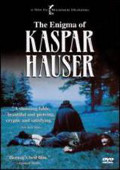
Directed by
Werner Herzog
110 minutes
Rated PG
Reviewed by
Bernard Hemingway


The Enigma Of Kaspar Hauser
Although the very limited nature of its subject matter means that at times interest can wane, Herzog’s film is a fascinating fact-based story of a young man who, early in the 19th century, mysteriously appeared in the town square of Nuremburg apparently never having had any previous contact with the outside world. Herzog’s account, which is based on Hauser’s diaries, empathetically and one assumes liberally recreates the events persuasively capturing the look of the period as well as interpellating some virtually self-sufficient visuals of a looking-glass view of the world that are reminiscent of German Romantic painting which was prominent at this time.
Herzog also uses Kaspar’s perspective as a “wild child” to satirize the formality and pretensions of conventional German society whilst in the role of Kaspar Hauser is the remarkable Bruno S. Although over 40 years old at the time whereas Kaspar is supposed to be in his teens, Bruno S, a street performer who had his own extensively dysfunctional past, is perfect for the part, bringing a sense of profoundly estranged isolation to the role that one can't imagine a professional actor achieving.
The sum is a remarkable work which was an arthouse hit winning Herzog the Grand Jury Prize at Cannes and bank-rolling his career for the next decade.
FYI: The original German title "Jeder für sich und Gott gegen alle' means "Every Man For Himself And God Against All" but this was changed to accommodate an American audience.
Available from: Umbrella Entertainment
Want something different?





